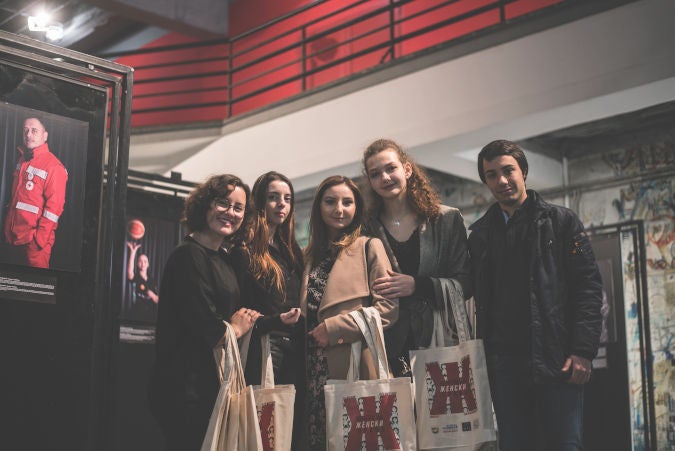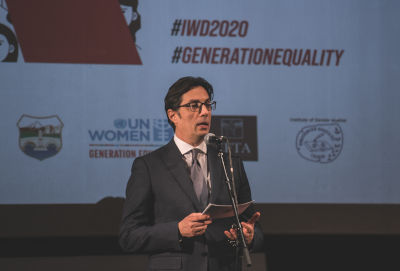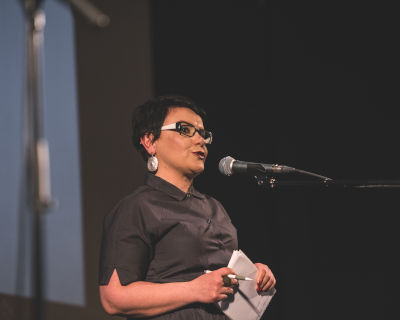High-level commitment to build a just and equal society took center stage at “Women’s Rights Nights” in North Macedonia
For International Women’s Day, high-level government officials, including the President of the Republic of North Macedonia, gender equality experts and advocates called for immediate actions to accelerate the achievement of gender equality and women’s rights, and end discrimination against women and girls.Date:

Around 200 guests, including the President of the Republic of North Macedonia, the UN Resident Coordinator, high-level government officials, diplomats, civil society organizations, activists and experts, have gathered on 6 March in Skopje for the opening night of the 11th Edition of the Women’s Rights Nights, a cultural event to mark International Women’s Day. Their message was loud and clear: End gender inequalities now!

“On 8 March, we are reminded of the progress achieved for gender equality, the long road taken for the advancement of women’s rights and our collective dedication for building a just and progressive society for all. Besides the positive gender-sensitive legislation, we need effective implementation and adequate budgetary support, gender-responsive policies in all areas, dedicated and long-term investment in gender equality and education,” stated Stevo Pendarovski, President of the Republic of North Macedonia.
The UN Resident Coordinator, Rossana Dudziak, noted: “As a woman, I know that despite the progress, we can’t talk about achieving true gender equality, until we release all women from all forms of pressure, from the environment and from the pressure that we create for ourselves. This, to me is the true spirit of the Sustainable Development Goals (SDGs) and SDG 5 [on gender equality].”

The 11th Edition of the Women’s Rights Nights was marked under the global theme “I am Generation Equality: Realizing Women’s Rights for an Equal Future!”. The event was organized by the City of Skopje, the University for Audio-Visual Arts EFTA, the Institute for Gender Studies at the Faculty for Philosophy in Skopje and UN Women.
“The conservative, patriarchal society barrier imposes a great burden to women which, in most cases, is wrapped in silk gloves. The representation of women in the media, for the most part, show woman as beautiful, easy to use. Gender blindness brings discrimination. And every type of discrimination is a violation of human rights and at the same time, women’s rights!,” said Ana Jovkovska, a prominent Macedonian writer, journalist and activist.
Lenche Zdravkin, a great humanitarian and activist, recognized in North Macedonia and abroad, talked about her experience during the refugee crises and the issues women and children face. “To be good and strong is not enough. Therefore, I fight for a gender-equal and just society for all,” said Zdravkin.

Ana Golejshka Dzikova, poetess and activist, and one of the founders of the Retweet meal, an initiative to serve food for the hungry and homeless, said: “To give a hand to someone, to nurture empathy, to build a sense for community is my greatest strength, and that is what I mean when I say – Equality is Built with an Attitude! Having self-awareness and self-power, women are in possession of a much greater capacity for action.”
“In my opinion, there can be no complete freedom unless women have reproductive freedom. To fully enjoy reproductive freedom means that women have control of all decisions related to their body – without discrimination, force and violence. The limitations of the reproductive freedom for women mean denying their sexuality, body, individuality and their rights. Therefore, unless the states do not guarantee the reproductive freedom for women, there will be no equality between women and men in the society,” said Bojan Jovanovski, the Executive Director of NGO HERA - Health Education and Research Association from Skopje.

“To be a woman is a beautiful and great challenge. To be a woman with disability brings higher risk for multiple discrimination,” said Luljeta Ademi, activist and feminist.
The 11th Edition of the Women’s Rights Nights hosted two exhibitions: international art exhibition Awakening, curated by Shkipe Mehmeti, which included artworks of 11 women artists from North Macedonia and abroad, and the exhibition of student photographs: Breaking the Pattern, created by the students of the University for Audio-Visual Arts EFTA and the Institute for Gender Studies. The Croatian documentary movie, The Diary of Dijana Budisavljevic (2019), a winner of the Pula Film Festival for best documentary movie and best director, was also screened. The Director of the movie, Dana Budisavljevich, addressed the audience in a heart-warming video message.
Women’s Rights Nights will also feature screenings of two documentary movies with guest-speakers and debates with high-school students.